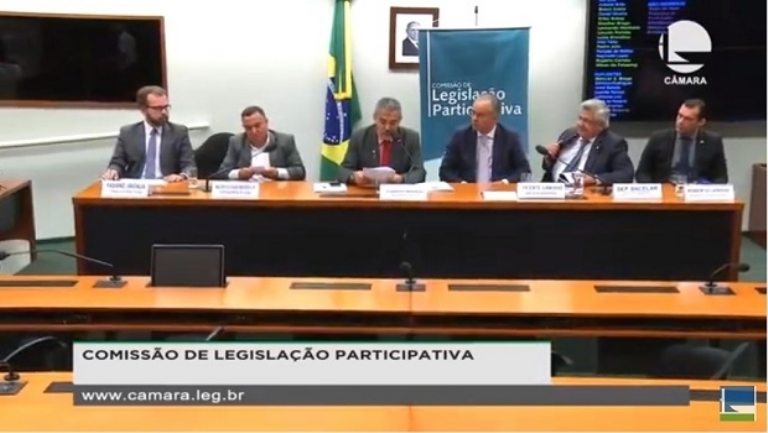Zona de Azar Brazil – Brazil: The Hearing Debates Defending the Legalization of Gambling Have Started

Brazil.- 06th December de 2019 www.zonadeazar.com The Coordinator of the Joint Parliamentary Front for the approval of the Regulatory Framework of Gaming, Deputy Bacelar, opened the hearing debates defending the legalization of the activity stating that humanity has played since ancient times and that there are only two possibilities: illegal or legal gambling, but what is not possible is that gaming does not exist.
He also presented historical data on how gaming were banned and the progress of bills 186/2016 in the Senate and 442/91 in the House, both awaiting for vote in the plenary. The deputy stressed the economic importance of gaming stating that activity can generate about 600 thousand jobs, a revenue of R$ 60 billion (US$ 14b), a state collection R$ 20 billion (US$ 4.75b) and pointed out that Brazil follows the opposite path of several countries in the world showing data from various world organizations where most of their member countries have legalized gambling.
Concluding his presentation, Rep. Bacelar stated that keeping gaming out of legalization is putting it in a gray zone and turning it over to crime, a path that may have no turning back. “The non-legalization of the activity is to leave it in a gray area, favoring corruption and marginality. There is a huge social demand for gambling in Brazil; see the lotteries as an example, and we are pushing this game to marginality. Either the State takes care of this follow-up or we will lose it to the traffic and the militia and I don’t know how we will do to get it back,” concluded the parliamentarian.
Who also defended the legalization of gaming was the former federal deputy and current Director of Institutional and International Relations of Corinthians, Vicente Candido. He said he was at the meeting supporting football and argued that most bets are made on sports and it needs to have a return. The former parliamentarian cited an article by former Supreme Court judge Ives Granda, who defends the need to know how gaming works in order to be aware of possible problems and stated that the ideal scenario would be a world without games, but that does not correspond to reality.
“I want to give my support, a support with reservations. It is not the state of my dream, but I want to face reality as it is and work to ensure that we have a regulatory framework that is not exaggerated, that takes all possible care and protection of human beings. Today, the only advantage that has the State is indirect employment, legal or not, it generates employment. This economic modality could contribute much more to Brazilian society,” he concluded.
Replacing Professor Pedro Trengrouse and representing the OAB, Fabiano Jantalia, a member of the Special Commission on Sports Law, Lotteries and Entertainment of the OAB Federal Council, argued that gambling activity in Brazil started as a public safety funding policy. The lawyer also pointed out that the country has always had a legal tradition favorable to games and that it was on a liberation lane until the ban, that the Brazilian has a gambling culture and that he likes to gamble. He concluded by stating that those who suffer with ludopathy and other sort of diseases of illegal gambling today are unprotected by the State, and that, in addition to deciding whether to legalize the activity or not, it must also worry about the next step, which is regulation.
“The biggest challenge, in my view as a researcher on the subject, is not whether we go or not, but if we decide to legalize gaming, it’s how to do it. My biggest concern is not whether or not there will be, but how it will be done. We can’t risk retailing to have a casino and bingo around every corner. We need to address this consciously, as Portugal, Singapore and Macau did; we have to know even pull the good cases,” said Jantalia.

After the representative of the Brazilian Bar Association, it was the turn of Waldir Eustáquio Marques Junior, a member of SECAP, who represented the Ministry of Economy replacing the Minister Paulo Guedes, who was invited but cannot attend. The undersecretary avoided entering into discussions about the legalization or not of other gaming modalities saying that the Ministry will respect the position of parliament and highlighted the work of SECAP for the improvement and development of what already exists in terms of legalized gaming in Brazil that are the lotteries, operated by Caixa and regulated by its secretary in the Ministry of Economy.
Waldir said SECAP has been working to break the lottery monopoly and to open the market in order to make the business efficient and beneficial to the country. According to him, today the value of transfers from lotteries for social and incentive programs to society is around R$ 6 billion (US$ 1.4b).
He also cited work on sports betting regulation stating that a change to law 13,756 was attempted as requested in public consultations, but was not possible and that the ministry is working on a new decree based on the law the way it is today evaluating the norm as median. Still under decrees, the undersecretary stated that SECAP is working on a new regulation of sweepstake model lotteries that can improve the regulation of this modality based on the results of horse racing and make it attractive to investors.
Defending the non-legalization of gaming, Roberto Lasserre, attended representative of the Brasil Sem Azar Movement (Brazil with no Gaming Movement); Marcos Linhares, from ‘Cruz Azul’ NGO, and Deputy Francisco Jr., Coordinator of the Catholic Mixed Parliamentary Front. Both pointed arguments such as money laundering, ludopathy, and other ideas such as luring tourists seeking illegal activities such as child prostitution, a possible bankruptcy of hotels and smaller businesses after the installation of large casino resorts in tourist areas and also religious issues.
The public hearing on the legalization of gaming was chaired by Rep. Leandro Monteiro, who was also the author of the request that enabled the debate, was accompanied by 16 deputies present, as well as representatives of civil society,
Source: Exclusive Games Magazine Brasil
Edited by: @MaiaDigital www.zonadeazar.com








































